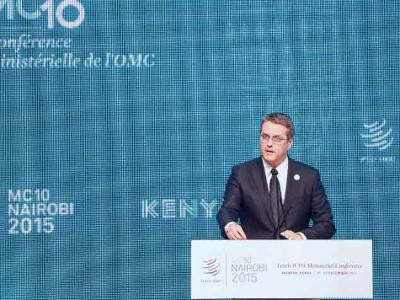
NAIROBI: A group of 47 countries — including India, China, South Africa and host Kenya — on Tuesday came together to argue that Doha Round should remain firmly on WTO’s agenda and in the process attempted to block moves by advanced countries led by the US to focus on “new issues” without dealing with their concerns.
A joint statement released on the day the first WTO ministerial began in Africa was meant to clearly signal that several developing and poor countries remained united in pushing the Doha agenda, which included reduction in farm subsidies by the developed countries and allowing more open flow of professionals and FDI across borders in return for lower import duty on agricultural and industrial goods.
“We recognize that the Doha Development Agenda (DDA) is a significant multilateral attempt to respond to trade and development interests of developing members and redress the imbalances codified in the rules resulting from the previous rounds of multilateral trade negotiations. We reaffirm the Declarations and Decisions we adopted at Doha, and all subsequent Declarations and Decisions and reaffirm our full commitment to give effect to them,” a joint statement released late Tuesday evening said.
It also set the tone for the ministerial meeting amid fears in the Indian camp that Doha may be given a quiet burial and new issues such as competition policy, labour and environment may enter the agenda.
“…we recognize that a comprehensive conclusion of the DDA with economically meaningful and balanced outcomes will provide impetus to global trade liberalization and facilitation, correct the development deficit in the rules resulting from the previous rounds of multilateral trade negotiations and improve the trading prospects of developing Members, and enhance the primary role of the WTO in global trade governance,” the statement said.
Earlier on Tuesday, India applauded host Kenya’s attempt to keep the focus on the Doha Round and issues that impact the poor. “The Kenyan president (Uhuru Kenyatta) spoke what many of us have felt… The outcomes are important and it was heartening to know that the emphasis is on agriculture and that livelihoods of people are linked… It is now up to the ministerial to deliver,” commerce & industry minister Nirmala Sitharaman told reporters.
She said that agriculture issues marked a very important component of the developmental debate.
India has been pushing for special safeguard measures to protect farmers from import surges besides seeking a permanent solution, or a change in formula for calculating the support given for food procurement.
On Tuesday, Sitharaman met her South African trade minister Rob Davies and is expected to meet her Chinese counterpart Gao Hucheng.
In their address Kenyan trade minister Amina Mohamed and the WTO chief Roberto Azevedo identified the success at the Bali ministerial meeting two years ago – in agreeing to a trade facilitation agreement along with addressing India’s concerns on food procurement – but there was no specific mention of delivering on the latter here.
There was also recognition that the WTO members were deeply divided and an ambitious work programme with a one size fits all approach would not work. “We are not looking at a perfect outcome… Whatever the outcome it will not be as comprehensive and ambitious as when we began the journey,” Azevedo said.